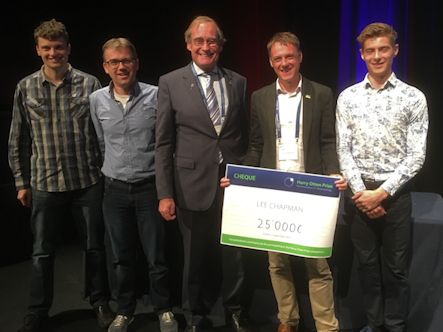Harry Otten Prize for Innovation in Meteorology awarded in Dublin
Lee Chapman, Professor at the School of Geography, Earth and Environmental Sciences, University of Birmingham, UK receives 25’000 Euro for his idea of using low-cost sensors and the Internet of Things to advance weather forecasts.
The Harry Otten Prize for Innovation in Meteorology has been awarded for the third time. During the Annual Meeting of the European Meteorological Society in Dublin, Ireland, the jury announced that Lee Chapman has won the first prize of 25’000 Euro. His idea, High-Resolution Monitoring of Weather Impacts on Infrastructure Networks, is to use the “internet of things” and low-cost sensors to monitor the weather on a very dense network to improve short-range forecasting. Chapman provided one example where low-cost sensors connected to the internet could provide real-time information on the condition of roadways in winter to inform efficient applications of salt on road surfaces and at the same time avoiding wasteful oversalting of roads that are above freezing. In a second example, he showed how other sensors could detect leaf wetness on railways, which often cause train braking problems in autumn.The winner of the prize was selected from three finalists. The other two finalists received 2’500 Euros for their ideas.
Tom de Ruijter, a computer scientist at Big Data Republic in the Netherlands, presented an innovative idea Making use of errors in consumer weather data to derive advanced weather parameters. De Ruijter proposed to use errors in ground surface measurements to derive information about meteorological conditions such as nighttime cloud cover and snow vs. rain conditions.
Gert-Jan Steeneveld and Sytse Koopmans, Wageningen University in the Netherlands discussed their idea CrowDat@ssimilation: Assimilation of crowdsourced meteorological data in NWP models to improve small-scale weather forecasts. The basis of this idea is to use crowd-sourced data in high-resolution numerical weather forecast models to improve short-range forecasts.
Overall the jury received 12 applications for the prize from different European countries and the USA. The Harry Otten Prize is awarded every two years.
Richard Anthes, Chairman of the Board of the Harry Otten Foundation, commented: “Lee Chapman’s idea of using many low-cost sensors, all connected to the internet to deliver immediate observations of weather and weather impacts such as road conditions, has the potential to substantially increase our ability to know when and where hazardous conditions exist and increase users’ confidence in using these forecasts in critical weather situations.”
Harry Otten was pleased at the announcement of the 2017 winner of the Prize: “After a number of years of retirement, I have started Wettermanufaktur as a new weather business in Berlin. The first customers for the company are the authorities responsible for sanding and salting the roads. The idea of Lee Chapman to use low-cost sensors to measure the road conditions could be very valuable in providing better services to our customers.”
